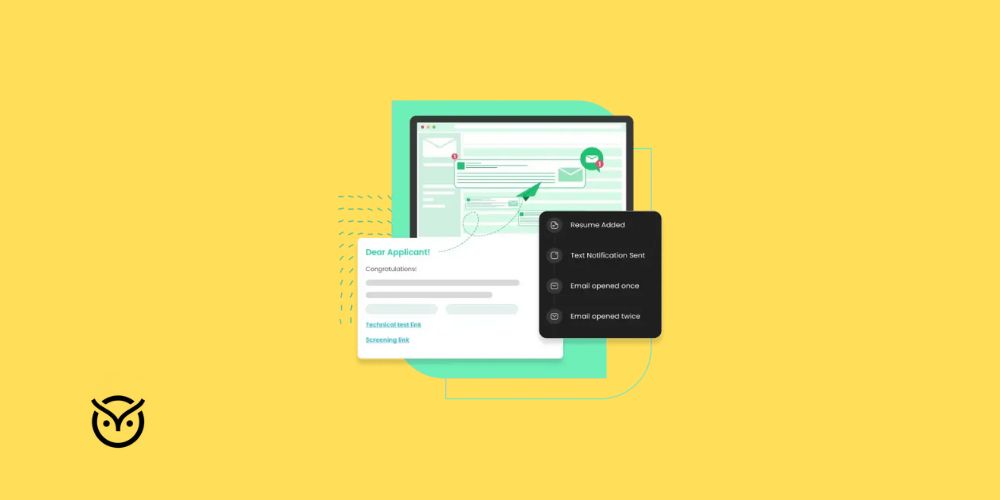
TL;DR
- Feedback shows what worked and what didn’t
- Ask clear, specific post-interview questions
- Give feedback that’s honest, specific, and kind
- Use templates for structure and consistency
- Turn feedback into an action plan for improvement
You’ve just walked out of a job interview. You feel good, but not certain. Days pass, and when the email finally arrives, it’s either a short “we’ve decided to move forward with other candidates” or complete silence. Sound familiar? Many candidates are left guessing what went wrong or right because they never get clear interview feedback questions or answers.
This blog will serve as your roadmap to getting and giving better feedback after interviews. You’ll learn what interview feedback actually means, the most common interview feedback questions to ask or expect, and how to use that feedback to improve for next time.
Understanding Interview Feedback

Interview feedback isn’t just a polite formality. It’s a reality check disguised as courtesy. For candidates, it shows what landed well and what fell flat, whether it was their answers, energy, or total lack of eye contact. For hiring teams, it’s a chance to refine the process instead of pretending instinct is a hiring strategy. Less guesswork. More growth. For everyone.
According to TalentLyft, candidates who receive feedback are 4 times more likely to apply to the company again. Let’s be honest. Most companies treat feedback like a mystery flavor no one asked for. But when you’re transparent? You win. It earns trust, makes you memorable, and builds a brand people actually want to work for.
And if you’re wondering what some examples of positive interview feedback that don’t sound robotic are, here’s one:
- “You broke things down like a strategist and explained your thinking like a human, not a spreadsheet. And that project management experience? Easily one of the highlights.”
On the flip side, examples of interview feedback that help candidates improve could look like:
- “While your experience is solid, we were looking for more direct leadership examples. Consider preparing a few stories using the STAR method next time.”
An interview feedback template brings structure and consistency to the hiring process. A solid one lets you rate key skills like communication, problem-solving, and technical ability.
Common Interview Feedback Questions

Asking the right interview feedback questions can turn a vague rejection into a roadmap for growth. But here’s the catch: most candidates don’t know what to ask, and many hiring teams don’t know how to offer feedback that actually helps.
Whether you’re a candidate or a recruiter, here are some interview feedback questions that make the conversation more productive:
For Candidates:
- “Could you share which part of the interview I performed well in?”
- “What skills or qualifications was I missing?”
- “Was there anything in my communication or body language that stood out?”
- “How did I compare to the candidate selected?”
These questions are clear, respectful, and give the interviewer space to share specific details.
For Employers:
When giving feedback for an interview, consider asking internally:
- “Did the candidate demonstrate problem-solving effectively?”
- “Were there any concerns about culture fit or team collaboration?”
- “What areas does the candidate need to work on to be a better fit for future roles?”
These help structure interview feedback into something the candidate can actually use, not just a “no thanks.”
According to SurveySparrow, 94% of candidates want feedback after an interview, but only 41% actually receive it. That’s a big gap and an opportunity for companies to stand out by doing better.
Guess the Strong Feedback
Which of these is a strong example of interview feedback?
Crafting Effective Feedback

Writing good feedback is part art, part science. Whether you’re sending a note as a hiring manager or replying with a follow-up, effective interview feedback is always specific, honest, and kind.
Here’s how to craft feedback that’s actually helpful:
1. Start with something positive
Even if the candidate wasn’t the right fit, start with what went well. This keeps the tone constructive.
- “You presented your case studies with clarity and purpose, making it easy to follow your approach. Your research was thorough and showed a strong attention to detail.”
2. Be honest but tactful
Skip the vague stuff like “we went in a different direction.” Say something clear and useful instead.
- “We were looking for more hands-on experience with X software, which another candidate had.”
3. Use a simple structure
Use a simple interview feedback template with three parts:
- Strengths
- Areas to improve
- Final decision
This avoids fluff and makes feedback easier to understand and apply.
4. Tailor your tone to the situation
For example, if you’re rejecting a final-round candidate, your feedback for the interview should show appreciation for the time they invested. If you’re giving verbal feedback, keep it conversational.
Interview feedback examples (what works):
- “You clearly have strong leadership experience, but we were hoping to see more hands-on execution examples.”
- “You communicated with clarity and confidence, especially in the case presentation.”
These kinds of responses answer the classic candidate question: “What are some examples of positive interview feedback?” And they do it in a way that makes improvement feel achievable.
Remember, when crafted well, examples of interview feedback can help build long-term trust even with candidates you don’t hire today.
Build Your Interview Feedback
Start
Middle
End
Utilizing Feedback for Improvement

Feedback isn’t the finish line. It’s where growth begins. Whether you’re looking for a job or filling one, knowing how to apply interview feedback is what turns insights into real improvement.
For Candidates:
Say you get this feedback:
“You need more examples of team-based problem-solving.”
Instead of feeling discouraged, break it down:
- Revisit your past experiences and pull out relevant team scenarios.
- Practice storytelling using the STAR method (Situation, Task, Action, Result).
- Schedule a mock interview to refine your delivery.
Using this process, a simple note turns into an action plan.
For Employers:
Don’t just use interview feedback templates to evaluate candidates; use the data to refine your hiring process, too. If several candidates are struggling with the same question, it might be a sign that your job description or screening process needs a closer look and a quick fix.
Encourage interviewers to store and review feedback trends regularly. This turns feedback for an interview into a strategic tool, not just a one-off comment.
Self-Evaluation Checklist for Interview Improvement
Interview Feedback Tools and Templates

Let’s talk about your quiet MVP: tools. With the right ones in place, interview feedback isn’t a chore. It becomes faster, clearer, and a lot more impactful.
Popular Tools:
- Google Forms or Typeform
Easy to use and customizable. Great for creating post-interview surveys for internal teams or candidates. - Greenhouse
This ATS (applicant tracking system) includes structured interview feedback templates to ensure consistency across interviewers. - Notion or Airtable
Perfect for small teams that want flexible, organized templates for tracking candidate notes and feedback patterns.
Sample Interview Feedback Template:
You can customize this structure to fit your workflow.
Sample Interview Feedback Template
| Candidate Name | Strengths | Areas to Improve | Final Recommendation |
|---|---|---|---|
| John Smith | Strong presentation skills | Needs more role-specific experience | Consider for future openings |
| Maria Lopez | Excellent communication and leadership | Could improve technical depth | Proceed to next round |
Conclusion
Interview feedback questions aren’t just boxes to tick. They’re fuel. Real growth starts when you stop treating feedback like a formality and start using it like a strategy. Ask better questions. Give honest answers. Actually apply what you learn. With simple templates, real examples, and a mindset that doesn’t sleep on improvement, feedback stops being polite noise and starts being your secret weapon.
FAQs
- What did I do that helped the team finish work on time?
- Where did my handoffs stall and how did that affect you?
- When did I make your job easier and how?
- What should I stop start continue doing?
- One skill that would raise my impact in the next 90 days?
- How well did I share context and updates?
- How safe do you feel giving me pushback?
- What did you learn from a past miss and how did you fix it?
- Tell me about a skill you built in the last year and proof of it.
- When did feedback change your approach and what changed?
- How do you pick a next step when you do not know the answer yet?
- Must fix risks first for example role basics missing or safety checks.
- High impact skills next for example core tech or core writing or core sales.
- Easy wins that lift confidence for example small habit tweaks.
- Plan one small action per item and a date.
- What part of my interview helped your decision?
- Which answer should I tighten and how?
- What skill gap stood out and one way to close it?
- If I reinterview in three months what should be better?
- Is there a sample or metric that would have helped you say yes?




